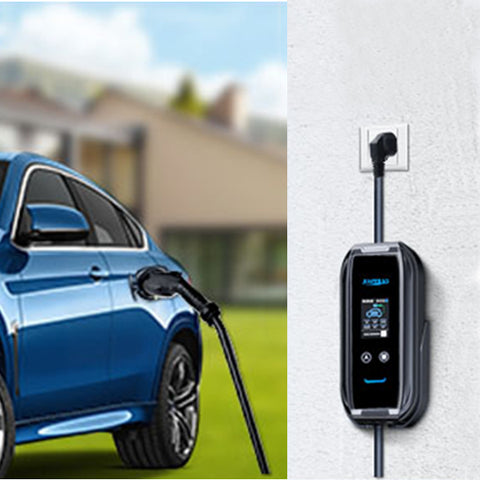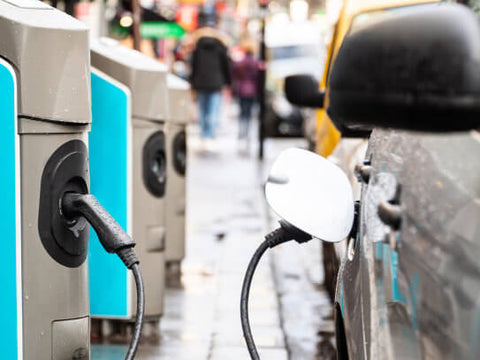How do I Know If My Portable EV Charger Is Capable of Level 2 Charging?
Apr 01, 2024

Level 2 charging offers significant benefits for electric vehicles (EVs), primarily due to its faster charging speeds compared to Level 1 charging. With Level 2 chargers, EV owners can enjoy shorter charging times, making it more convenient to top up their vehicle's battery, especially during short stops or emergencies.
However, traditional Level 2 chargers are stationary and require dedicated installation, which limits their flexibility. Portable EV chargers provide a solution for owners who need to charge on the go but typically offer Level 1 charging capabilities, which are slower. Understanding the various options available and how they align with different EV models and driving habits can help EV owners optimize their charging strategies and make the most of their vehicle's capabilities.
What Are the Requirements for EV Chargers Levels?
When discussing electric vehicle (EV) charging, it's essential to understand the distinctions between Level 1 and Level 2 charging in terms of voltage and power output.
Level 1 Charging
Level 1 charging operates on standard household electricity, typically using a 120-volt outlet. This level of charging is the most basic and accessible option for EV owners. While convenient, Level 1 chargers have lower power output compared to Level 2 chargers, resulting in slower charging speeds.
Level 2 Charging
In contrast, Level 2 charging requires a higher voltage and power output. Typically, Level 2 chargers operate on a dedicated circuit with a 240-volt electrical supply. This higher voltage allows Level 2 chargers to deliver more power to the vehicle's battery, significantly reducing charging times compared to Level 1 chargers. As a result, Level 2 charging is preferred for EV owners who require faster and more efficient charging solutions.
The Need for a Dedicated Circuit
One crucial aspect of Level 2 charging is the requirement for a dedicated circuit, usually operating at 240 volts. Unlike Level 1 charging, which can utilize standard household outlets, Level 2 charging demands a higher-power electrical supply to accommodate the increased voltage and power output.
A dedicated circuit is necessary to ensure safe and efficient charging operations. By dedicating a circuit solely to the EV charger, it prevents overloading of the electrical system and minimizes the risk of electrical hazards such as overheating or tripped circuit breakers.
Furthermore, the use of a dedicated circuit allows for optimal performance of the Level 2 charger, ensuring consistent and reliable charging sessions. This is particularly important for EV owners who rely on Level 2 charging as their primary method of charging their vehicles, such as those with longer commutes or higher daily driving mileage.
So, while Level 1 charging offers basic charging capabilities using standard household outlets, Level 2 charging provides faster and more efficient charging options. However, to leverage the benefits of Level 2 charging, a dedicated circuit with a 240-volt electrical supply is necessary. This ensures safe and optimal charging performance for electric vehicles, meeting the evolving needs of EV owners for convenient and reliable charging solutions.
How to Detemine Whether Your Portable Charger's Capabilities?
When determining whether your portable electric vehicle (EV) charger is capable of Level 2 charging, there are several key steps to take.
1. Checking the Charger's Label or Manual
First and foremost, refer to the charger's label or user manual for technical specifications. The user manual provides essential information regarding the charger's capabilities and compatibility with different charging levels.
Look for the voltage rating, which indicates the level of charging the charger supports. For Level 1 charging, the voltage rating is typically 120 volts, reflecting the standard household electrical supply. In contrast, a voltage rating of 240 volts signifies Level 2 charging capability, allowing for faster charging speeds.
Additionally, check the amperage output of the charger. Higher amperage output generally results in faster charging times, especially for Level 2 chargers. Understanding both the voltage and amperage specifications is crucial for determining the charger's charging capabilities.
2. Identifying the Plug Type
Another indicator of your portable charger's charging capabilities is the type of plug it uses. Standard household plugs, such as the NEMA 5-15, are typically associated with Level 1 charging and operate at 120 volts. If your charger utilizes a standard household plug, it is likely limited to Level 1 charging.
To identify Level 2 capable chargers, look for common higher-voltage plugs used for Level 2 charging. For example, the NEMA 14-50 plug is commonly associated with Level 2 chargers and operates at 240 volts. These plugs are designed to deliver the higher power output required for Level 2 charging, resulting in faster and more efficient charging times.
However, it's essential to note that simply having a Level 2 capable charger is not sufficient for faster charging. You also need access to a compatible outlet to utilize the Level 2 capability effectively. Level 2 charging requires a dedicated circuit with a 240-volt electrical supply, similar to what is used for large appliances like electric dryers or stoves. Therefore, ensure that you have access to the appropriate outlet to leverage the full potential of your Level 2 capable portable EV charger.
By checking the charger's label or manual for technical specifications and identifying the plug type, you can determine whether your portable charger is capable of Level 2 charging. Understanding your charger's capabilities allows you to make informed decisions about your charging setup and ensures that you can effectively utilize Level 2 charging when necessary.
Additional Considerations
In addition to identifying the capabilities of your portable EV charger, it's crucial to consider the compatibility of your home's electrical system with Level 2 charging, especially if you're aiming for the fastest home EV charger.
Ensuring that your home's electrical system can support Level 2 charging is essential for efficient and safe charging operations. Level 2 charging requires a dedicated circuit with a 240-volt electrical supply, which may not be standard in all households. Therefore, before investing in a Level 2 capable portable charger or installing a stationary Level 2 EV charger, it's advisable to assess your home's electrical infrastructure.
One way to determine compatibility is to consult with a qualified electrician. An electrician can evaluate your home's electrical system and advise you on whether any upgrades or modifications are needed to support Level 2 charging. This may include installing a dedicated circuit specifically for the EV charger to ensure optimal performance and safety.
By consulting with a qualified electrician, you can address any potential electrical issues and ensure that your home is equipped to handle Level 2 charging. This proactive approach not only enhances the safety and efficiency of your charging setup but also helps avoid any unforeseen complications or hazards down the line.
In a word, as you consider upgrading to Level 2 charging for your electric vehicle, it's essential to assess the compatibility of your home's electrical system. Consulting with a qualified electrician can help you determine whether any modifications or upgrades are needed to support Level 2 charging. By ensuring that your home is properly equipped for Level 2 charging, you can enjoy the benefits of faster and more efficient charging, making it the fastest home EV charger available for your needs.
What Are the Benefits of Level 2 Charging with Your Portable EV Charger?

Identifying Level 2 Capability
To determine if your portable EV charger supports Level 2 charging, check its technical specifications. Look for a voltage rating of 240 volts and a plug type associated with Level 2 charging, such as the NEMA 14-50r. These indicators suggest that the charger can deliver faster charging speeds compared to Level 1 chargers.
Safety First
Safety is paramount when dealing with electrical systems, particularly with Level 2 charging. Ensure that your home's electrical infrastructure can support Level 2 charging safely. If unsure or if any electrical work is needed, consult a qualified electrician. Professional assistance can ensure that the installation is done correctly and complies with electrical codes and regulations, minimizing the risk of accidents or damage.
Benefits of Level 2 Charging
Utilizing a Level 2 capable portable charger offers numerous benefits for EV owners. Firstly, it significantly reduces charging times compared to Level 1 chargers, providing added convenience and flexibility. With faster charging speeds, EV owners can spend less time waiting for their vehicles to charge and more time on the road. Additionally, Level 2 charging allows users to take advantage of higher-power outlets when available, further enhancing charging efficiency. By investing in a Level 2 capable portable charger, such as AMPROAD, EV owners can enjoy faster charging speeds and greater convenience, making the charging process more seamless and efficient. AMPROAD, with its Level 2 capabilities, offers EV owners the flexibility to charge their vehicles quickly and conveniently, whether at home or on the go.
FAQs / People Also Ask
Q: How can I determine if my portable EV charger supports Level 2 charging?
A: You can identify Level 2 charging capability by checking the technical specifications of your charger. Look for a voltage rating of 240 volts and a plug type associated with Level 2 charging, such as the NEMA 14-50. These indicators suggest that your charger can deliver faster charging speeds compared to Level 1 chargers.
Q: What should I do if I'm unsure about my charger's Level 2 capability?
A: If you're unsure whether your portable EV charger supports Level 2 charging or if any electrical work is needed, it's recommended to consult a qualified electrician. An electrician can assess your charger and your home's electrical infrastructure to ensure compatibility and safety.
Q: What are the benefits of ensuring Level 2 charging compatibility?
A: Level 2 charging offers faster charging times compared to Level 1 chargers, providing added convenience and flexibility for EV owners. By ensuring compatibility with Level 2 charging, you can enjoy quicker charging speeds and spend less time waiting for your vehicle to charge.
Q: Can I upgrade my existing portable charger to support Level 2 charging?
A: Upgrading a portable charger to support Level 2 charging is generally not recommended due to safety concerns. The internal components may not be designed to handle the increased power demands. It's best to consult with the manufacturer or a qualified electrician for guidance on upgrading or purchasing a new charger that supports Level 2 charging.
Q: Are there portable chargers specifically designed for Level 2 charging?
A: Yes, there are portable EV chargers on the market that are specifically designed to support Level 2 charging. These chargers offer the convenience of portability combined with the faster charging speeds of Level 2 charging. One example is the AMPROAD charger, which provides Level 1 and Level 2 charging capabilities in a portable package.




